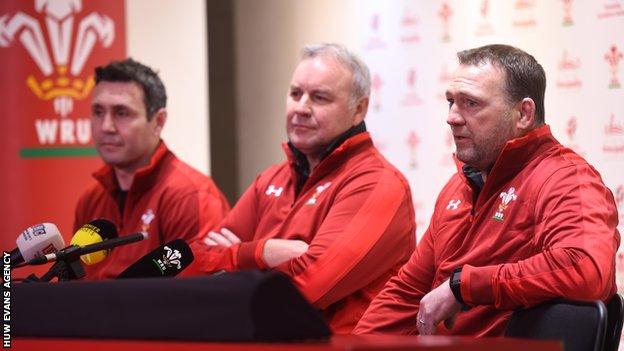Pay bands set to replace National Dual Contract in Welsh Rugby
- Published

Wales captain Alun Wyn Jones is due to have talks on his Ospreys future in the next month
A proposed pay banding system is set to signal the end of national dual contracts in Wales.
The Welsh Rugby Union (WRU) and the regions have been in negotiations with the players' governing body about a salary banding system from next season.
It would replace the current system which includes national dual contracts (NDCs).
The matter will be discussed among other subjects at meetings between the WRU and the four regions this week.
This includes funding discussions and the possibility of giving extra resources to certain regions.
Key meetings are scheduled for Tuesday and Wednesday as part of negotiations towards a new long-term agreement between the WRU and regions - a process dubbed as 'Project Reset'. The new deal will be called the Professional Rugby Agreement.
NDCs were introduced as part of the Rugby Services Agreement signed between the regions and union in August 2014, and were aimed at keeping star players in Wales.
The union pay 60% of the contract with regions picking up 40%, with 12 players currently on such deals.
Scarlets have five in Jonathan Davies, Gareth Davies, Leigh Halfpenny, Jake Ball and Samson Lee, alongside Ospreys quintet Alun Wyn Jones, Dan Lydiate, George North, Bradley Davies and Scott Baldwin.
Blues and Dragons have one player each in Gareth Anscombe and Hallam Amos.
The new pay structure would mean the regions funding the salaries within the proposed banding system, although current contracts will be honoured before NDCs are phased out.
WRU and Welsh Rugby Players Association (WRPA) will not comment while negotiations are ongoing.
The banding system will range from academy prospects to British and Irish Lions stars with players from the Welsh regions placed in groups according to their perceived worth.
People will be separated within regional and international bands and there are also some divisions within those categories to include what are termed as "marquee" players.
The ongoing issue has created concern with Ospreys coach Allen Clarke saying signing up a squad for the 2019-20 season has been difficult and caused angst among the players.

Wales backs Gareth Davies, Gareth Anscombe, George North and Jonathan Davies are all on NDCs
Wales captain Alun Wyn Jones says he will start talks on his future in the next month and this pay review was a major factor. Other players might find themselves victims of the new system.
Wales coach in waiting Wayne Pivac believes the banding process could work but admits everybody wanted to get things sorted sooner rather than later.
"If it is something signed off by the players, unions and clubs, it can only be a good thing," said current Scarlets head coach Pivac.
"It is like anything. It will get reviewed in time and has to be set in stone first.
"From what I have seen and discussed with the players, everyone seems pretty happy.
"I can only talk about the Scarlets because I am across our contracts and what the players values are.
"We pretty much fall into what the banding would be. There are probably only one or two players who are out of kilter, so from a Scarlets point of view, there won't be too many problems.

Pivac (centre) takes over from Warren Gatland as Wales coach after the World Cup in Japan in November
"There is a place for the national coach in these discussions, whoever it is, because you have access to information to how you rank the players.
"That is important information for players and clubs when you are sitting down negotiating figures."
Scarlets and Wales prop Rob Evans says most of his region are content with the proposed system.
"Things have not changed too much," said Evans.
"They came in and spoke to us and a lot of the boys are within their bands, although maybe other regions have been affected.
"I don't think there are many boys here outside of their band, maybe two, and they were not far off and were going to be reviewed."
Also being negotiated is the funding and status of the four regions, with the amount of money being given to each of the teams on the agenda.
There is a model being considered which would give extra importance and resources to certain regions, rather than the meritocracy of the past five years.
Favouring up to three regions could cause conflict as WRU bosses look at ways regions can compete with English, French and Irish teams in Europe with no side having reached the Heineken Champions Cup final since regional rugby's inception in 2003.